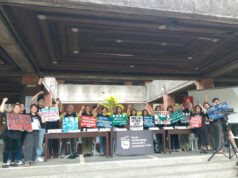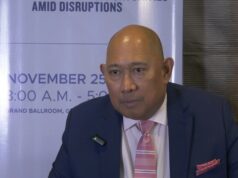Guevarra: ICC withdrawal no effect on justice system
By Arjay L. Balinbin and Vann M. M. Villegas
Reporters
THE PHILIPPINES has officially withdrawn from the International Criminal Court (ICC) as of Sunday, March 17.
This took effect a year after the country submitted its withdrawal to the United Nations secretary-general on March 17, 2018 following the announcement of the ICC Prosecutor Fatou Bensouda on Feb. 8, 2018 that the international body will conduct a preliminary examination on the alleged crimes against humanity of President Rodrigo R. Duterte stemming from his war against illegal drugs.
Justice Secretary Menardo I. Guevarra said membership or withdrawal from the ICC does not have any effect on the Philippines’ justice system.
“ICC has its own rules. But whatever it does, it doesn’t affect us. It does not have any jurisdiction over us, either ab initio (from the beginning) or by subsequent withdrawal,” Mr. Guevarra told BusinessWorld in a text message.
“Our justice system will continue to function whether or not our country is a member of the ICC. The ICC is not a substitute for functioning prosecutorial and judicial system, despite its imperfections,” Mr. Guevarra also said. “Absolutely no bearing if our criminal justice system is functioning vibrantly, as in fact it is.”
Mr. Duterte is facing two complaints before the ICC, the first one filed in April 2017 by lawyer Jude Joseu L. Sabio, legal counsel of Edgar D. Matobato who claimed in his Senate testimony that he was part of a hit squad operated by Mr. Duterte.
The second complaint was filed in August 2018 by activists and families of eight victims in the “war on drugs.”
For its part, the ICC in a report released in December 2018 said it will continue its preliminary examination and the assessment of the information they received against Mr. Duterte to determine whether the complaints fall within the jurisdiction of the court.
“The Office will also continue to engage with a variety of reliable sources and relevant stakeholders on all matters relevant to the preliminary examination of the situation in the Philippines,” the report read.
“The Court retains jurisdiction with respect to alleged crimes that have occurred on the territory of the Philippines during the period when it was a State Party to the Statute,” the ICC noted.
There are two petitions filed before the Supreme Court (SC), asking the high court to void the government’s withdrawal from the ICC.
The first petition was filed by opposition senators in May 2018, and the second petition by the Philippine Coalition for the International Criminal Court (PCICC) in June the same year. The SC also held two oral arguments over the petitions.
However, the SC on March 12, the last en banc session before the withdrawal took effect, did not render a decision over the petitions against the withdrawal.
Sought for comment, Michael Henry LI. Yusingco, senior research fellow at the Ateneo School of Government, said via e-mail on Sunday that the country’s withdrawal from the Rome Statute, the treaty that created the International Criminal Court (ICC), will “not affect our domestic criminal justice system.”
He noted that “the reforms we need to do in order to strengthen the rule of law in the country are still the same regardless of the ICC.”
For her part, University of the Philippines political science professor Maria Ela L. Atienza said in an e-mail: “Given that the local justice system is now practically the last recourse of citizens, there is a need to strengthen courts and as well as enforcement mechanisms.”
She added that this effort “is made more difficult under the current President (Rodrigo R. Duterte) who still vows to continue the war on drugs. But advocates of human rights, an efficient and equitable justice system and the rule of law to end impunity must work painstakingly to make sure that crucial institutions and processes will survive and have a chance to be improved and strengthened to last beyond the Duterte administration.”
Mr. Yusingco said, “We still need to improve the investigation capability of our police. Obviously, this is an ongoing project, but one improvement could be in the field of forensic evidence gathering and analysis. I think we need more police officers who have expertise in this area, especially given the view that Asia, particularly Mindanao, is the new breeding ground for violent extremism. In cases of terrorist attacks, the scene of the crime is usually the only place where relevant evidence can be found. Hence, forensic expertise becomes very important in not just getting the perpetuators, but also in preventing future attacks.”
“We still need to upgrade the support mechanisms for our prosecutors. One area could be how to establish a smoother institutional link between the police and the prosecutors…. And most definitely, we still need to employ innovative measures to ensure the speedy delivery of criminal justice by the courts. One area could be the application of new technology in conducting court hearings. New ways of appreciating evidence should also be considered,” he also said.
Ms. Atienza said the “whole Philippine justice system as well as independent bodies like the Commission on Human Rights, human rights and other watchdog groups, as well as mass media will have to strengthen their capacities to make sure that the rule of law and the dispensation of justice will prevail, no matter how slow the process can be.”
Also sought for comment, Polytechnic University of the Philippines (PUP) sociology professor Louie C. Montemar said via chat: “I see three key concerns: addressing the case backlogs in our courts; improving the investigatory and forensics ability of our concerned units in the justice system; and ensuring the independence of our courts or their insulation from undue political pressures.”
Citing recent studies on the matter, he said: “The best deterrent to crime…is the certitude of criminals getting caught and paying for their crimes. This means an able police force and an effective justice system.”
Ms. Atienza noted that there are “questions about the independence of the judiciary” and “legitimate concerns” that the country’s withdrawal from the Rome Statute “may lead to more human rights violations and impunity.”
Mr. Montemar said, “Under a national leadership that is not very sensitive to human rights concerns, what else could there be then to keep in check our state from breaching the limits of its powers? This does not bode well for us all even after the Duterte regime.”
He added: “There is no real limit to state power but the law and our people. What then happens without the ICC? We can only rely on ourselves. And we know, by history, how messy things can be under such a condition.”
For his part, Mr. Yusingco said “our withdrawal does not mean crimes against humanity, genocide, aggression, and war crimes can no longer be filed in our behalf in the ICC. But the problem will still be how to assume jurisdiction over the person accused of these crimes. In fact, even if we remain with the ICC, our government will still be tasked to bring the person accused before the ICC. Will any administration in the future be willing to do this? This remains to be seen.”
“And I think it is wrong to say that the withdrawal of the Philippines from the ICC means those responsible for the 20,000 deaths resulting from the government’s drug war can no longer be prosecuted. They can still be made responsible for their crimes under our own penal laws. Simply put, these are murders. And the only way the perpetuators can get away scot free is if we Filipinos let them. If we forget about their crimes and let history pass without any cases being filed against them,” he added.
The Philippines, according to Ms. Atienza, “will also lose its international reputation (even with cases of violation of human rights happening) which it has slowly built since 1986 as one of the strong advocates of human rights in Asia and the world, even extending to strong advocacy for the protection of its large number of migrants working abroad.”
Mr. Yusingco said, “Our standing in the international community will not be impacted by the withdrawal from the ICC because the fact remains that more than 20,000 Filipinos have been killed in the name of the administration’s drug war since 2016, and their deaths stand unresolved. This dire fact is a stain on our police, prosecutors and courts equally. More crucially, such an atrociously high number of deaths is a shame (that) we, Filipinos, all bear. For how come our moral outrage has yet to be felt? Our country’s withdrawal from the ICC does not make this embarrassment any worse.”
For his part, Mr. Montemar said this action by the Philippines “gives a sign to other nations that we are not very reliable in following through on our international commitments.”
Also sought for comment, CHR Spokesperson Jacqueline Ann C. de Guia said in a phone message on Saturday that the commission “continues to view the unilateral withdrawal of the Philippine President from the ICC as a reversal of the country’s commitment to international treaty obligations, particularly in ending impunity, and a step back from the gains the Philippines has achieved in promoting justice and human rights.”
“The Filipino people…are bound to lose when they no longer have the recourse in times when local justice systems fail in protecting them. It is then impunity that wins as a consequence of withdrawal.”
She further said that “the task before the Philippine government is to show — beyond words — that it is willing to investigate, prosecute, and punish perpetrators of alleged extrajudicial killings linked to the government’s anti-drug war.”
“The best way to move forward is to cooperate in ICC’s preliminary examination and demonstrate its commitment in ending impunity, rather than blocking avenues in seeking justice — and perhaps reconsider its withdrawal from the Rome Statute as stronger sign of its dedication to the rule of law and human rights,” Ms. de Guia added.



